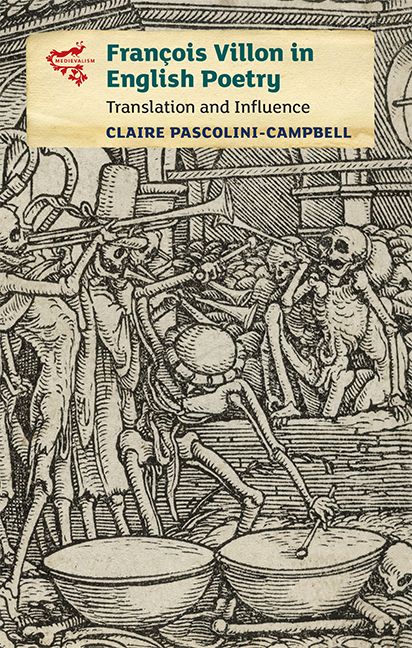Book contents
- Frontmatter
- Contents
- A Note on the Poets and the Poems
- Acknowledgements
- Introduction
- 1 Then and Now: The Legend of Villon in the Middle Ages and in Modernity
- 2 Villon and Swinburne: Finding and Singing Villon
- 3 Villon and Rossetti: Poetics of Strangeness
- 4 Villon and Pound: Modernity and the ‘Mediaeval Dream’
- 5 Villon and Bunting: Prison-Writing and Parody
- 6 Villon and Lowell: Imitation and the Visible Translator
- Conclusion
- Appendices
- Bibliography
- Index
- Medievalism
6 - Villon and Lowell: Imitation and the Visible Translator
Published online by Cambridge University Press: 09 October 2019
- Frontmatter
- Contents
- A Note on the Poets and the Poems
- Acknowledgements
- Introduction
- 1 Then and Now: The Legend of Villon in the Middle Ages and in Modernity
- 2 Villon and Swinburne: Finding and Singing Villon
- 3 Villon and Rossetti: Poetics of Strangeness
- 4 Villon and Pound: Modernity and the ‘Mediaeval Dream’
- 5 Villon and Bunting: Prison-Writing and Parody
- 6 Villon and Lowell: Imitation and the Visible Translator
- Conclusion
- Appendices
- Bibliography
- Index
- Medievalism
Summary
ROBERT LOWELL (b. 1917–d. 1977), like Bunting before him, was influenced by Pound in his decision to translate Villon. He makes this debt explicit in a 1962 letter, thanking Pound for having been ‘a fountain’ to him, before crediting him with his discovery of Villon. He adds that he is sending Pound a copy of his new book of translations, ‘real translations in their way’, of the kind he anticipates the recipient will approve:
Ezra, I think you should feel happy about your life, and the thousands of kindnesses you have done your friends, and how you've been a fountain to them. So you've been to me, and I miss the old voice. I'm asking my publisher to mail you my two last books, translations, but real translations in their way I hope like yours. You may like some of them, perhaps the Leopardi, Villon and Rimbaud, first read by me after reading your criticism.
The book of translations in question was Imitations, first published in 1961, and a volume that groups together poets from Homer to Pasternak. Organised chronologically, Villon is inserted between Sappho and Leopardi and serves as the sole representative of the medieval period in what Lowell describes as his ‘small anthology of European poetry’. Villon's medievalness, however, scarcely registers and it is his similarity to the other poets in the collection, as opposed to his temporal and cultural strangeness, that Lowell seeks to emphasise. Indeed, while Swinburne sought kinship with the ballad-makers of the past by recycling their forms and ornaments of sound, and Pound used his ‘personae’ to establish a cross-temporal community of poet-exiles, Lowell sets out to write ‘one voice’ into his imitations, exploring continuities of theme and tone in the tradition of European poetry. His method, however, is not without its detractors, as we shall see below.
Imitation as Provocation and Lowell's ‘one voice’
In choosing to call his volume ‘Imitations’ Lowell invites critical opprobrium from the outset, self-consciously engaging with a mode traditionally deplored by translation theorists. For example, John Dryden defines imitation as the lesser of three types:
All translation, I suppose, may be reduced to these three heads. First, that of metaphrase, or turning an author word by word, and line by line, from one language into another. This, or near this manner, was Horace in his Art of Poetry translated by Ben Johnson.
- Type
- Chapter
- Information
- François Villon in English PoetryTranslation and Influence, pp. 141 - 162Publisher: Boydell & BrewerPrint publication year: 2018

